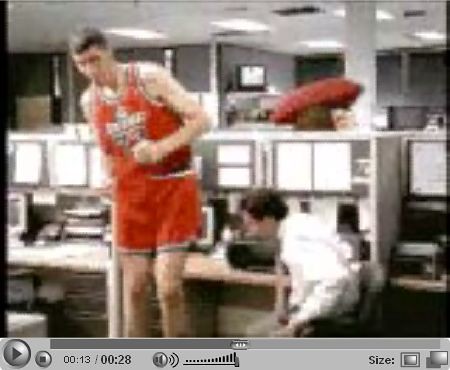This all started when I blasted Bill Simmons for his ongoing (and ongoing, and ongoing, and...) diatribe about Nash. Amazingly, a few days after I made that post, Simmons did an about face after one of his readers compared to Billy Packer (the same guy who once called Allen Iverson a "monkey"). But then, in true Sports Guy fashion, he tried to justify his previous criticism of Nash by heaping praise on the little Canuck's teammates. I must, of course, ridicule his efforts.
One more thing while we're here: Nash's supporting cast, even without Amare Stoudemire, is better than everyone thinks.I'll discuss the relative quality of Nash's supporting cast in the following paragraphs. But isn't it interesting how average to mediocre players look really good when they're on a team with great players who know how and when to get them the ball? Back in the late 90s, when the Utah Jazz made back-to-back appearances in the NBA Finals, experts and analysts were effusive in their praise of guys like Bryon Russell, Shandon Anderson, and Howard Eisley. These guys were never top-tier players. They weren't even middle-tier players. Playing with John Stockton and Karl Malone made them look much better than they actually were, a fact that became quite obvious when they left the Jazz to take on bigger roles on other teams. I could make a laundry list of the so-so players that looked great playing with guys like Larry Bird, Magic Johnson, Michael Jordan, and so on. But I'm sure you get the point.
Shawn Marion is a top-25 guy in his prime.There's no denying that. But then, so is Kevin Garnett. And Paul Pierce. And Tracy McGrady. Most NBA General Managers (and fantasy team managers) would take all three of those guys ahead of Marion in a mock draft. But having incredible talent, and putting up big-time numbers, doesn't necessarily equate to winning (hence those three guys got an early vacation this year). Marion isn't a leader. He's a solid "numbers guy." He's actually a lot like Elton Brand in that regard. Notice how Brand has been a 20/10 guy his entire career, but only got noticed (and became an MVP candidate) this season...when he was finally teamed with a competent point guard/floor leader (Sam Cassell)? And lest we forget, Kevin Garnett won his MVP and made his only significant post-season run when teamed with Cassell. One of the saddest facts in professional sports is that gaudy statistics mean much more to people than leadership. You can watch highlights of a 360 dunk, and you can look at a box score and see somebody's 20/10 line. But you can't measure leadership and inspiration. Marion doesn't give that. Nash does.
Raja Bell is the evolutionary Bruce Bowen.So he's the "evolved" version of a guy with career averages of 6 points and 3 rebounds a game? Woo hoo. The reality is, he was a kicked away by a lottery team (Utah) that didn't see the worth in re-signing him. And don't forget: Bell was the replacement for Joe Johnson, and everybody was forecasting doom and gloom for Phoenix. In fact, many people openly scoffed at the Bell signing. Now Bell is Mr. Amazing. He had career highs in every major statistical category, but that's because of Mike D'Antoni's system and Nash's distribution, not because Bell is an "elite" player. I guarantee he wouldn't be this good if he was on, say, the Lakers.
Is that so? Because Atlanta wasn't exactly committing homicide to hold on to him last summer. The guy was averaging 4 points (on 42 percent shooting) and 2 rebounds last year, and he was considered a disappointment. The Hawks were more than happy to ship him off as part of the Joe Johnson trade. And it wasn't a straight-up, man-for-man transaction either. The Suns also got two future first round draft picks and a $6 million trade exception. That's how "valuable" Diaw was. Now he's playing with Nash in an up-tempo system and he's getting 13 (on 52 percent shooting) and 6. And those aren't "great" (i.e., max contract) numbers. He's playing very well in the playoffs, and now Simmons is talking about him making The Leap. This is the same Sports Guy who's usually very skeptical of guys raising their stock with some bigtime playoff performances. You know, Greg Ostertag did the same thing in '97. I'm just sayin'.Every team in the NBA would kill to have Boris Diaw, who can play four positions and doesn't need the ball to be effective; he's only 23 and getting better by the week. (He's a mortal lock for my annual top-40 trade value list this summer, by the way.)
Say what you want about Thomas, but there are only a handful of forwards who can post up little guys, shoot 3s over big guys and guard both types of players. (If he hadn't been such a dog for the past nine years, he'd be in line for a $50 million contract after the playoffs.)The Bulls thought so much of Tim Thomas they wouldn't even play him, despite a notoriously weak front line. And by the way, other teams weren't exactly beating down the Bulls' door to work out a trade for Thomas. Nobody wanted to touch him until Chicago ate his contract. As for the 26 games he played for Phoenix...well, 11 points and 4.9 rebounds a game aren't exactly all-world numbers. The fact is, he's a "big man" who can't play defense (0.3 blocks per game in nine seasons) or hit the boards (his 4.9 rebounding average with the Suns is a career high). He played really well for the Bucks in the playoffs one year, got the big contract, then loafed through the next several seasons. The Knicks were happy to dump him and the Bulls didn't even want him on the court. He fits in Phoenix because he likes to hang back and shoot jumpers, which is what they do. He gets open shots because Nash penetrates and kicks it out to him. He doesn't work anywhere else. Hell, Simmons even said he's been a dog for nine years! How do you praise and insult someone simultaneously?
And Leandro Barbosa is the most underrated player in the league -- he scores on everybody, heats right up off the bench (no small feat), plays both guard positions, carries the offense for quarters at a time...and he's only 23. You're looking at this generation's Vinnie Johnson at the very least.Barbosa looks great...on Phoenix. I promise you, his scoring output maxes out at 10-12 PPG on any other team other than the Suns (unless he gets carte blanche on a lottery team, ala Joe Johnson). He rarely plays point guard anymore, and D'Antoni is terrified to leave him in the point position for very long. He scores on a lot of quick slashes to the hoop on fast breaks and by hitting 44 percent of his threes. He's a system player. He'll starve if he leaves Phoenix. Or if Nash leaves/retires/dies.
Here's the point: Maybe the Suns only go six deep, but they're all elite players who mesh perfectly together...What kind of Bizarro World does Bill Simmons live on?! Boris Diaw, Leandro Barbosa, Raja Bell, and Tim Thomas are "elite players"?! Is tha some kind of sick joke? I don't remember ever seeing these guys on an All-Star ballot, let alone on the team itself. Elite players...psssht!! Not even close, Bill. I agree that they work very well in D'Antoni's offensive system, but they "mesh perfectly together" only because Nash is the glue that binds them.
...and they have a world-class coach who gives his players the freedom to ad-lib (like when Thomas audibled out of the set play and passed to Diaw for Wednesday's game-winner).Mike D'Antoni is a world-class coach? I must have missed that memo. Forget about the fact that he's never won an NBA title -- the yardstick by which coaching "greatness" is typically measured -- let's look at his pre-Nash coaching record. He coached the Denver Nuggets for 50 games during the 1998 season, and he turned in a 14-36 record. In 2003, he took over a Suns team that was 8-13, and they went 21-40 the rest of the way (from five games under .500 to 19 games under .500...be still my heart). That was a team with not one but two certified 20/10 guys (Marion and Stoudemire), by the way. They add Steve Nash the next season and go from 29 wins to 62. 'Nuff said. D'Antoni has a good system, and the horses to run it, but Nash makes that system work.
I still think the Clippers should have beaten them, and I'll always wonder what would have happened if Odom pulled down that rebound in Game 6 in the Lakers series...Magic Johnson and the rest of the '84 Lakers still think they should have beaten the Celtics that season. To this day, it still bugs the living shit out of Magic and crew. And if not for a few turnovers and a couple missed free-throws, the Lakers would have swept that series instead of losing it in seven. So you can cry sour grapes all you want. But in the end, one team wins and one team loses. Saying one team "should have beaten" another is the most meaningless statement in sports. And you, Mr. Simmons, always cry "foul" when the Colts claim they were the "better team" and "should have beaten" New England, or Pittsburg, or whoever. Now you're doing it. Hypocrite.
As for Odom's miscue, you could just as easily wonder what would have happened if the refs had called a foul on Odom or Luke Walton at the end of Game 4, or if they'd noticed Walton was standing out of bounds when he tied Nash up, or if they'd heard Nash or Diaw call for time. I mean, seriously, give me a break.
Bill Simmons isn't the only person who persists in disagreeing with me. Mr. Anonymous is back (or maybe it's a new Mr. Anonymous), and he continues to prattle on. Even though he's an idiot, I still want to address some of his points.
What about how Nash can't play defense? How do you defend Nash on that one?It's pretty easy, actually. I decided to do a little research into Nash's defense. I've already noted that Smush Parker was horrible against him, and Cassell wasn't all that great either. But, according to some, Parker was just in a slump and the Suns used team defense against Cassell. Fine. Well, I decided to see how Tony Parker fared against Nash this season. Parker averaged a career high 19 points per game on 54.8 percent shooting. The kid was dynamite. Against Nash he had games of 19 (8-for-18), 18 (9-for-19), 29 (12-for-21), and 13 (5-for-11). So he had one game well below his average, two games at around his average, and one above average game. Only once did he shoot 50 percent or better; his percentage fell into the 40s for the other three games (a dramtic drop). You'd think a guy who scores almost 20 points per game on 55 percent shooting would have been lighting Nash up, particularly if Nash is as bad a defensive player as everyone maintains.
Nash is not a great defensive player by any stretch of the imagination. But he's not as bad as his detractors claim, either. A handful of sports writers -- like Bill Simmons -- have degraded Nash's defense and now it's become The Gospel. I did a quick cross-section of the Suns games in February (my birth month -- it's all about me), and saw that Nash held Kirk Heinrich to 0-for-7 shooting (and zero points) on February 4, held Mike Bibby to 2-for-9 shooting on February 10, held Bobby Jackson to 4-for-19 shooting on February 8, held Andre Miller to 5-for-12 shooting on February 15, and (on the second night of back-to-back games) held Rafer Alston/David Wesley to a combined 4-for-16 shooting. Now, except for Alston/Wesley, those are pretty good players. If Nash "can't play defense," these guys should be scoring at will with high percentages. Right?
So, contrary to popular belief, opposing point guards aren't always having their way with Nash. Sure, if you look you'll find games where guys play well against him. But that happens to everybody. I didn't hear the world screaming when Paul Pierce scored 39 on Kobe (a supposed defensive stopper). Lebron James isn't a gifted defender either. Other great players (and former MVPs) were less than stellar defenders: Larry Bird, Magic Johnson, Charles Barkley, just to name a few. Shaq, another former MVP (and the guy some people think should have been MVP last year) is absolutely terrible in defending the screen and roll. The point is: Nash as a bad defender is both overblown and somewhat moot.
What do you have to say about the fact that Nash has been unbelievably un-clutch this playoffs?I say you should try watching the games before saying stupid things. Facing elimination against the Lakers in Game 6 at L.A., Nash scored 32 points (including a huge three-pointer with 50 seconds to go) and dished out 13 assists. The Suns won that game in overtime. Nash hit the go-ahead bucket with under 10 seconds to beat the Clippers in Game 3 of that series. He then almost single-handedly closed the Clips out in Game 7, with 29 points and 11 assists. Less than 48 hours later, he dropped 27 and 16 on the Mavericks -- in Dallas -- and the Suns stole Game 1. And in case you didn't watch that game, the Suns were down 9 in the fourth quarter when Nash scored 10 straight points and then dished for another two (on a sick dunk by Marion) as the Suns took the lead. That one-man 10-point run, by the way, included two gut-check three-pointers and a ridiculous off-the-top-of-the-glass drive against the 7-foot Dirk Nowitzki (who fouled him without a call, by the way). There's your clutch play, son.
I think he's hit one big shot (against the clippers) so far but other than that, the dude has been nutting up in crunch time.See above.
His two infamous turnovers against the Lakers in game 4?I posted video and pictorial evidence that Luke Walton's foot was clearly out of bounds when he supposedly tied Nash up (thus forcing the second of the two turnovers you're referring to). And he was fouled. And he was calling timeout. Two refs were standing right there to see it. It was a totally bogus. The only thing "infamous" about that turnover was the home cooking that caused it.
How he short armed that WIDE OPEN, game tying three from the corner (which Tim Effing Thomas eventually hit about 10 seconds later) against the Lakers in Game 6? His two turnovers late in the pivotal game 5 against the Clippers? Sure you could argue that it doesn't matter because they won both those series. But in the discussion about Nash's personal performance, it can't be ignored.In your rush to criticize Nash and point out his shortcomings, not only are you ignoring his accomplishments (which I've discussed in short above), you're ignoring some of the "un-clutch" performances of the other MVP candidates during this year's playoffs. Kobe had two games with seven turnovers, and of course his infamous 3-shot second half against the Suns in Game 7. Lebron coughed the ball up seven times in the Cavaliers 2-point loss to the Pistons in Game 6 of that series (he also shot 8-for-20). Lebron was 11-for-24 in Game 7 and the Pistons blew the Cavs out. Dirk Nowitzki scored only 11 points (on 3-for-13 shooting) the other night and Phoenix blew the Mavericks out. According to 82games.com, Kobe is 7-for-28 in "clutch shots" over the past three seasons. Everybody remembers the seven shots he hit, but what about the 21 shots he missed? During the same period, Nash was only 1-for-8 in clutch shots, but he had 6 clutch assists. Kobe had zero clutch assists, by the way.
But that's not the point. The point is, basketball players -- even the great ones -- are human. They have bad games. They miss shots. They make mistakes. They have great games and sub-par games, which are summed up to create averages. There's so much scrutiny these days, every single performance is put underneath a microscope. When a player has a bad shooting game, he's in a slump. If he turns the ball over late in the game, he choked under pressure. If you look back in NBA history, plenty of the all-time great players have dropped stink bombs during the playoffs. I could make you lists of times the Bill Russells, the Wilt Chamberlains, the Jerry Wests, the Magic Johnsons, and the Michael Jordans have blown games in the clutch. Take Jordan, for example. People remember that shot he hit against Craig Ehlo in Game 5 in 1989. What people conveniently forget is that he cost the Bulls Game 4 by missing two key freethrows in the final 30 seconds. Of course, when you win, everybody forgets about those things. Hopefully the same thing will happen for Nash some day.
And this has nothing to do with the MVP discussion. I just wanted you to realize that Nash has choked on several occassions this post season and has been picked up by his teammates in very, very important junctures.Seriously dude...so what? The same can be said of every clutch player who ever lived. Remember when John Havlicek stole the ball to save Game 7 of the 1965 Eastern Conference Finals? He only had to do that because Bill Russell, the 5-time MVP (and he was MVP in 1965), the 11-time world champion, had just thrown the ball away and given the Philidelphia 76ers a chance to take the game. As far as I know, nobody took back Russell's MVP because his teammates had to bail him out after he choked. It's a team game, my friend. Teammates help each other. And considering the fact that Nash spends most of his time making his teammates better...well, they owe him one.
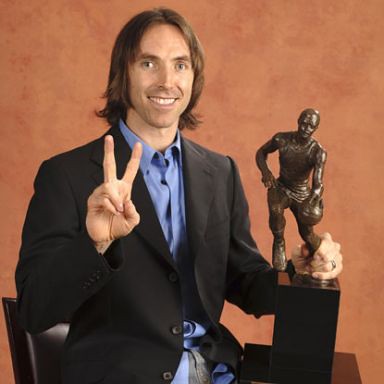
Let's get the ball rolling:
Rog: I love it when white people put down white athletes and say and do things in a manner that a black person would do them. I saw plenty of this behavior in college. As a non-Anglo, it amuses the hell out of me. It's like some type of bizarre self-hatred and sociological affirmative action rolled into one big mess. Bill Simmons: One Jive Turkey!Most people -- and this definitely includes basketball analysts -- are more impressed by speed, power, and sheer athleticism than anything else. That's why many people don't remember just how great Larry Bird really was. When you see Bird on a highlight film, it's usually one of his patented step-back jumpers or a slick (but fundamentally sound) pass. You don't see him flying around the court and dunking the ball. So how could he have been great?
The same goes for John Stockton. That guy has 5,000 more assists than the next closest player (Mark Jackson) on the all-time list. He was responsible for at least 10,000 more points than any other passer/playmaker ever. He could also score when inclined, shot over 50 percent for his career (something the great Michael Jordan didn't even do), and won a lot of games. But he was unspectacular, boring to watch. So there are people (and Bill Simmons is among them) that would claim that, say, Isiah Thomas was the better point guard. Not true. Faster? Absolutely. More explosive scorer? Certainly. But a better playmaker? Hardly.
And all this lack of credit comes from the fans...most of which, according to demographic studies, are white. Do we hate ourselves? Or have he just been trained to believe that atheltic black men are inherently better basketball players than unathletic white players? This answer may surprise you: I have no idea.
Anonymous: one, let's not use the postseason to justify who won the MVP. last i checked it was awarded for the regular season.Indeed it is. And since Nash won the MVP award in the regular season, I guess my argument was moot. But he has been MVP-like in the post-season as well, leading his team to victory when other MVP candidates have not.
Anonymous: When exactly did Simmons claim to be an unbiased expert? I must have missed it...You're right. He's biased (particularly toward Boston-based teams) and lets everyone know it. However, he has claimed that his personal biases do not affect his ability to rationally and accurately assess the sports he covers. That's just not true. When he develops a beef against someone, he becomes almost entirely incapable of judging that person solely by their merits and ability.
Laura: first, let me say that this was a great smackdown of bill simmons.Thanks.
Second, i agree with anonymous that you shouldn't use the postseason to justify the mvp award.And, in all fairness, so do I.
third, i love steve nash and i love his politics. but i think the regular season mvp should have gone to either dirk nowitzki or lebron james. i think part of the reason nash is doing so well is because of the rule changes stern made and because d'antoni is such a great coach. the system nash is in is conducive to the new rule changes, so that explains nash's increased success.
A lot of the anti-Nash sentiment comes from the "Mike D'Antoni is such a great coach" contingent. But is he really? I mean, he coached Denver to a 14-36 record in 1998. He was 21-40 in his first season with Phoenix, despite having two legitimate 20/10 guys on the roster (Marion and Stoudimire). So his pre-Nash coaching record was 36-76. Then he teams up with Mr. MVP and wins 62 games. There's no question that D'Antoni chose the perfect system for his personnel. But the whole "great coach" sentiment is either overstated or unproven.
As for the rule changes, those were put into effect this year. They were not in effect last season when the Suns won 62 games and Nash got his first MVP. His scoring was up three points per game, but that was due more to Stoudemire being out (giving him additional scoring responsibility) than any rule changes. He attempted 40 more freethrows this year, sure, but he also took over 100 more shots than the previous season. He also shot better from the field and the line. Nash isn't an athletic 2-guard. Those are the guys who really benefited from the rule changes. Guys like Kobe, Lebron, Paul Pierce.
I don't agree that Lebron was more deserving of MVP than Nash. The Suns were a better team in a better conference. Now Dirk, on the other hand, that I might agree with. And that dude has been absolute dynamite in the playoffs. I mean, his rebounding numbers have been through the roof. He's MVP of the playoffs so far.
i'm not saying that nash should give back his mvp. i'm just saying that no way he's on the same level as a player as tim duncan, magic, bird, and jordan, who all won back to back mvps. there are other players who are better overall players than him who never won an mvp, much less back to back.No, I wouldn't put nash in the Bird/Jordan/Magic category just yet. And yes, there are better players who never won an MVP. But nonetheless, last year he joined a team that had won 29 games, and a coach with a career 36-76 record, and made it a 62-win team. Then, when that very same team lost several key components (Quentin Richardson, Joe Johnson, and Paul Shirley) and Stoudimire went down for the season, the Suns still managed to win 53 games. And Nash made castoffs like Kurt Thomas, Boris Diaw, Raja Bell, and Tim Thomas look like fantastic players. No one else even wanted those guys. Nash has taken them to the Western Conference Finals. Would you compare Marion/Bell/Diaw to Pippen/Grant/Paxon? Or Pippen/Rodman/Harper? Or McHale/Parish/Johnson/Ainge? Or Kareem/Worthy/Wilkes?
shaq hasn't won back to back mvps--and he's a greater player than nash, even though his game is clearly going down. why is that? is nash at his best anywhere near shaq's game at his best? yet nash is the one with 2 mvps.Shaq has no one to blame for his lack of MVPs but himself. The Diesel lost out on several MVPs because 1) he misses about 20 games a season with minor (re: questionable) injuries, 2) he usually coasts through the regular season, saving his best for the playoffs (when he inevitably shines), and finally 3) because he would often show up to training camp overweight and use the regular season as his personal weight loss program. He once had surgery right before the season started because he didn't want to miss out on any fun during the summer. He even said, "I got hurt on company time, so I'm going to get better on company time." That's not an MVP attitude. So while there was no question of his greatness, particularly in relation to Nash, there have been questions about his desire and dedication...at least during the regular season. When he was with the Lakers, his team should have won 60 games every season. Instead they'd go through long stretches of mediocrity and strife, then turn it on in the playoffs. The factors counted against Shaq in MVP voting.
it's like phil jackson and his 9 rings. he only won one coach of the year award. it's these kind of things that make year end awards seem like a joke.You said that MVP is based on the regular season, not on the playoffs. Similarly, Coach of the Year is based on a team's regular season performance, not on whether it wins the championship.
That said, Jackson's teams have had some pretty good regular season success. But his Lakers teams (as I pointed out above) often loafed through the regular season. That counted against him, since he is considered "The Great Motivator." The voters probably wondered why he couldn't keep his L.A. teams focused for 82 games. It also hurt his case that he arguably had the two best players in the league on his teams, both in Chicago and L.A. But yeah, Phil should have one at least one or two more CotY awards. And Jerry Sloan should have won at least one.
You know, K.C. Jones won 62, 63, and 67 games during his first three years as coach of the Celtics. He also won two championships during that period. But he didn't get any serious Coach of the Year consideration. He, like Jackson, was penalized for coaching great players. CotY typically goes to guys who got the most out of the least, or something like that.
sameer: I find myself disagreeing with Simmons fairly often, though I do read a lot of him. BUT...I tend to agree with his assessment of Nash in the Clippers/Suns series. And here are the holes in your argument.I disagree. But I'll hear you out.
- You tout his 18 and 11 average for the series, but really you're proving Simmons' point because he only eclipsed 18 points twice in the series in the two great games that juiced his series numbers. And you shouldn't really tout an 18 point average when he averaged 20 in the regular season, and it's not like his assist average skyrocketed at the same time.There's a reason an average is called an average. Do you think Kobe scored 35 every game this year? He had games in the 20s and in the teens. Would you say his 81 and 62 point games "juiced" his average? Of course they did. But again, it's an average.
As for his scoring average dropping from 20 to 18; that's pretty typical in playoff basketball. Kobe's average dropped from 35 to 27 PPG...a much more significant drop than Nash's. (And his 50 point game "juiced" his series average, didn't it?) Besides, as I said in my post, the Clippers were employing a "Stop Nash" strategy. They were double-teaming him both on and off the ball.
But all that is beyond the point. Nash's scoring is and always will be secondary to what he really brings to the team. He sets the tempo and distributes the ball, and thereby gives his team the best possible opportunity to score.
- You identify game 4 as a bad game, and game 3 as a good game. I think you would be hard pressed, based on the numbers presented alone, to prove any significantly different statistical difference in a game when he scored only 4 points (2 baskets!) less, had one more assist (one basket!), and the same number of rebounds. The point is, if game 4 is a bad game, then so is game 3.I didn't particularly feel like giving a game-by-game recap. In this case, the numbers I presented don't tell the full story. In Game 3, Nash dished a couple key assists down the stretch. He also held Sam Cassell to 2-for-10 shooting and only 6 points (and Cassell got benched as a result). Most importantly, Phoenix won the game. Conversely, Cassell exploded in Game 4 (28 points, 11 rebounds, 9 assists), Nash wasn't able to control the tempo down the stretch, and the Suns lost. So yeah, I stick by my good game/bad game descriptions.
- Players are always, ALWAYS, judged by their talents. A good game is relative. For a player of Nash's offensive caliber, 14 and 8 is not a good game. It's, in fact, below average for him. 12 and 10, 8 and 11, same thing. Not good Steve Nash games. Games 5 and 6, despite scoring below his average, are at least closer to what the man does in your average regular season game.Here's Kobe's scoring numbers for the seven games he played in the playoffs: 22, 29, 17, 24, 29, 50, and 24. Only once in seven games did he reach or exceed his regular season average. He scored 18 below his average once, 13 below his average once, 11 below his average twice, and six below his average twice. So did Kobe have six "bad" games? It would seem so, based on your rationale. Based solely on his talent, and his ability to score, and the Suns' less than stellar defensive abilities, he should have easily exceeded his average every game. Right?
But that wasn't the game plan. Kobe scaled back his scoring, either by Phil Jackson's request or because he wasn't shooting well. He played a team game, for most of the series anyway. That's what Steve Nash does every game. Some nights he scores 20+, some nights he doesn't. But he still leads his team and helps get the most out of the guys on the floor. Watch the Suns play sometime when Nash is on the bench. There's a startling difference. It's not just about his scoring, which, for the most part, was adequate (especially since, by their own admission, the Clippers were keying in on Nash the whole series). It's about creating for others. That's what Nash does best.
If you are the Boston Celtics, and you get Nash's games 2 through 6 out of Delonte West, you are definitely thrilled. But if you are the Suns and have Steve Nash, reigning two-time MVP, those are not good games. Those are below average games. I love watching Nash play, but I don't think he's shown MVP form in the playoffs besides for a few games. How many times were you watching and thinking, "Wow, that's the best player on the court right now." And I know that MVP and Best Player on Court are different beasts entirely, but still. I think that warrants mentioning.According to Elliot Kalb, known in basketball circles as "Mr. Stats", players typically suffer a 15 to 20 percent statistical drop-off in the playoffs. This happens for a variety of reasons, but mostly because a team is able to develop and employ specific defensive strategies over the course of a seven-game series. Kobe had six (out of seven) "sub-par" scoring games. Lebron James had several games in which he scored below his regular season average, or dished out fewer assists, or grabbed fewer rebounds. That's just the nature of the beast in the NBA Playoffs. The Clippers used a trapping, double-teaming strategy against Nash. He was still able to orchestrate two great games, and four other solid (if "below average") performances. If what Nash brings to the Suns could be measured by numbers alone, that would mean something. But great players, MVP-caliber players, bring more than statistics. They inspire their teams and lead them to victory. And that's exactly what Nash did.
Bill Simmons recently climbed to the top of our "Sports Analysts We'd Like To Throttle About The Head And Neck" list, thanks mostly to his continuing diatribe against Steve Nash. Simmons claims to love Nash's style of play and team-first attitude. Yet he hates, hates, hates the fact that a funny-looking, floppy-haired little white guy won back-to-back MVPs. And that's fine. As a basketball fan, you can love or hate whatever you want for whatever reasons you want. But when you try to represent your feelings as fact, that's when I have to step in and insult you. And your mother. Have I mentioned she's a fatty? Well, she is.
Anyway, I'd like to take some time to refute some of the bull feces I read in Simmons' latest column:
I hate to keep harping on Steve Nash's faults because he's such an extraordinary offensive player to watch, and he was spectacular in back-to-back Game 7s...Here's a standard rule of thumb. When someone begins a sentence with "I hate to say this, but...", they're probably about to say something stupid. And the reality is, they don't hate saying it at all. They want to say it. Bill Simmons has been disgruntled ever since Nash was selected for his second consecutive MVP Award, and he seems incapable of talking about Nash or the Suns without belittling Nash's game. It's like he has some rare form of Tourette's that revolves entirely around how Steve Nash shouldn't be MVP.
...but when you play 35 minutes a game during the season, followed by a seven-game series against the Lakers in which you didn't have to play any defense at all, followed by a couple of tough games against the Clips, I don't want to hear how tired you are.Fine, Bill. Don't read the news then. Or read it, but try to take some time to discriminate between what a player said and how what he said was interpreted and portrayed. When you see a headline like "Nash Complains Of Tired Legs," it's easy enough to heap criticism on him. I mean, what's he complaining about? He's a two-time MVP, for Chrissakes! Everybody's tired at this point of the season, aren't they?! What a whiner!
It's not that simple, of course, and Bill Simmons -- of all people -- should realize that. I did a Google news search for every possible iteration of "Steve Nash" and the word "tired" that I could imagine. Then I searched Yahoo news. Then I searched Technorati. Nowhere could I find a direct quote of Steve Nash "complaining" about anything. He went through a mid-series shooting slump against the Clippers, and the sports writers (as is their way) pressed him relentlessly for The One Reason for his faltering jumper. "Is it your bad back, Steve? What about the hamstring you've been having problems with? Is that sprained ankle from the Lakers series still bothering you? What's the story, Steve?"
Instead of playing the injury card, Nash simply gave credit to the Clippers' double-teaming defense and said that his legs were fatigued (which they were) and he therefore couldn't have his normal jump shooting range (which he didn't). He only confirmed what we all could see with our own eyes while watching the games. That was it. Or it should have been. But the news media, always searching for a scoop, couldn't leave well enough alone. They had to editorialize. According to one article, "It's been a long, arduous season for Steve Nash." According to another, "Steve Nash continues to play bravely through pain and exhaustion, despite an ever growing fatigue that has robbed him of his jump shot."
For the record, Nash has not (to my knowledge) described this season as arduous. He has not (as far as I know) discussed his "brave" play or his "growing fatigue." That's simply the media creating a story where no story really exists. And then, of course, Bill Simmons jumped all over it and used it as another piece of ammunition in his running critique of Nash.
Lastly, Bill also failed to point out that Nash has been logging more than 40 minutes throughout back-to-back seven game series...while directing an offense that's more like a track meat than a basketball team. Throw in the fact that he might have a spinal stress fracture, still has the bad hammy, and suffered an ankle sprain a fews weeks ago, and you have a guy with some very valid reasons to complain a little. And yet...he really hasn't.
Especially if you're a two-time MVP. The fact remains, Nash played only two good games in that series -- Games 1 and 7 -- and the Suns still won the series. If Nowitzki goes 2-for-7 against the Spurs, Dallas is going home right now. So who's more valuable? You tell me.I guess MVPs never complain, do they? I'll get to that in a minute. According to Mr. Simmons, "Nash played only two good games" in the Suns/Clippers series. That's a fact. Bill Simmons said so. But here are a few other facts for you to chew on. Nash averaged 18 points and 11 assists for the series. Those are pretty amazing numbers considering he had only two "good" games out of seven. I've got an idea. Let's take a peek at Nash's series against the Clips.
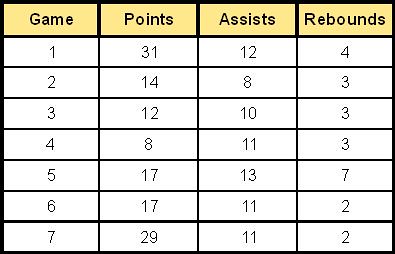
Only two good games? Hardly. It looks to me like he had two great games (Games 1 and 7), four good -- or even very good -- games (Games 2, 3, 5, and 6), and one bad game (Game 4). And despite the shooting slump (6-for-20 from the field and 0-for-8 in threes over one stretch), he still shot 48 percent for the series. And he's shooting over 50 percent for the playoffs. MVP also-rans Kobe and Lebron shot 49 and 47 percent respectively. For the sake of comparison, Allen Iverson shot 38 percent in the playoffs during his MVP season, and yet nobody talked about him being in a shooting slump. Interesting, isn't it?
And he's right. The Mavericks wouldn't win if Dirk Nowitzki went 2-for-7. He's a scorer. That's what he does, and that's what his team counts on him for. Nash is a passer first and a scorer second. He can run the offense and guide his team to victory even when he's not shooting well. And, frankly, the ability to find a way to win without a major scoring outburst does make him more valuable. I shouldn't have to explain that to an expert.
(You know who should have been tired? Shawn Marion, who played 3,268 minutes in the regular season, nearly 500 more than Nash, then upped it to 42.3 minutes a game in the playoffs as Phoenix's only reliable rebounder/shotblocker -- he had to play both ends of the court and guard everyone from Odom to Kobe to Kaman to Cassell, then have something left as the second scoring option. And while we're here, Larry Legend logged more than 4,000 minutes over eight grueling months during the '86-87 season without hearing a single "Wow, he's getting tired" excuse. Warrants mentioning.)This is another thing that bugs me about Simmons. He loves to toss out Larry Bird comparisons to prove his points. That doesn't work with me. I don't like to brag, but I've read almost every book and magazine article that's ever been written about Bird. When I'm feeling really frisky, I go to the library, reserve a microfiche machine, and read through old Boston Celtics game recaps and box scores. Harvard University is even considering awarding me an honorary Ph.D. in LarryBirdology. So, suffice to say, I know at least as much about Larry Bird as Simmons, and probably more.
Regarding Bird's '86-87 season. The Celtics were the defending champions. They had a a litany of injuries -- Walton's foot, McHale's foot and ankle, Parish's ankle, Ainge's knee and hamstring, Bird's back and elbow -- and the worst bench of all time. The starters all averaged between 38 and 42 minutes a game, and they were noticeably worn out as the season progressed. Don't listen to Simmons. The press made a very big deal of the Celtic's exhaustion, especially when the team lost 10 of 11 on the road, and finished with the first (and only) sub-500 road record of the Bird era (20-21). Even more was made of it during the playoffs, when the Celtics endured back-to-back seven game series against the Bucks and Pistons. The Celtics had squandered a 3-1 series lead against the Bucks, mostly due to Bird's disappearing act in the fourth quarter of Games 5 and 6 (he didn't hit a shot in the fourth of either game). Tommy Heinsohn, who called Game 7 for CBS, talked about how tired Bird looked. And how emaciated (Bird had gone on a "7-Up and popcorn" diet before the playoffs, because he thought dropping 20 pounds in three weeks would help his game).
It wasn't just the press, either. According to Peter May's book The Big Three, Bird himself admitted to being exhausted after beating the Pistons and making it back to the NBA Finals. Bird even said, and I quote, "I wish we didn't have to play another series." I think that warrants mentioning too, Mr. Simmons.
And as long as we're using Larry Bird comparisons to prove our points on Nash, one of Simmons' biggest gripes is how Nash rests on defense so he can go all out on offense. It's funny, but you know...Bird did the same thing. In Jack McCallum's book Unfinished Business: On and Off the Court with the 1990-91 Boston Celtics, it was described in great detail how Bird would be allowed to guard the opposing team's least effective frontcourt player while McHale and Cedric Maxwell would be forced to guard the Dr. Js and Dominiques of the world. Bird, meanwhile, was given the freedom to zone out and pick off passes. Bird is therefore often described as a great team or "help" defender. But you won't hear Simmons direct criticism at Bird's defense.
Bottom line: Nash deserved the be named MVP. Kobe quit on his team and quite possibly cost them any chance of winning Game 7 against the Suns. Lebron was eaten alive by the Pistons in Games 6 and 7 of the Detroit/Cleveland series. Nash, on the other hand, came through for his team in two fabulous Game 7s, and he put them on his back and willed them to victory last night on the road against a superior Mavericks team. He won it. He earned it. Get over it, Bill.
Click on the pic to watch it. You'll laugh. You'll cry. You may even mash your own testicles in order to historically recreate the moment. I know I did.
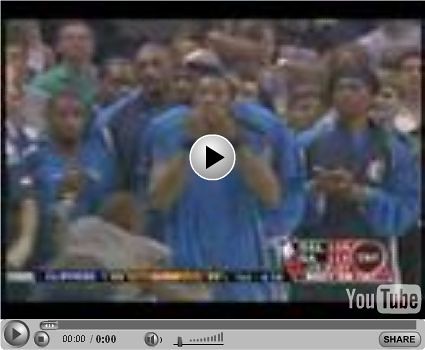
Usage example: Dirk Nowitzki's post-game celebration (see below) showed the world that he does, indeed, participate in manscaping.
Word History: The earliest citation of the term "manscaping" appeared in an August 29, 2003 Sacramento Bee article titled "Sign us all up for our makeovers." The author, Anita Creamer (I'm not making that last name up), is not credited for inventing the term, but she was probably the first to use it in print. The term gained widespread popularity in association with the Queer Eye For The Straight Guy reality show, in which it was revealed that gay men enjoy removing any and all body hair from themselves and others. It was probably around the same time that we at Basketbawful started noticing the near-to-complete lack of armpit hair among NBA basketball players. This is especially noticable among the white players. I'm not trying to turn this into a racial thing, but if you're a slow, moderately tall white man (such as myself) who plays pick-up hoops at the local rec centers, then you know white players tend to have pits full of matted, tangled, stringy, sweaty hair. Basically, imagine having Chris Kaman's hair, only in your armpit instead of on your head. The fact that you never see that sort of thing in the NBA tells me that either A) aliens are harvesting armpit hair from our mightiest athletes as part of some body hair-related conquest of the Earth, or B) professional basketball players are participating in some rather unmanly manscaping activities. And hey, I'm all for it. The last thing I want to see is somebody's knotted, dripping pit monster on television. But it's still kind of fruity.
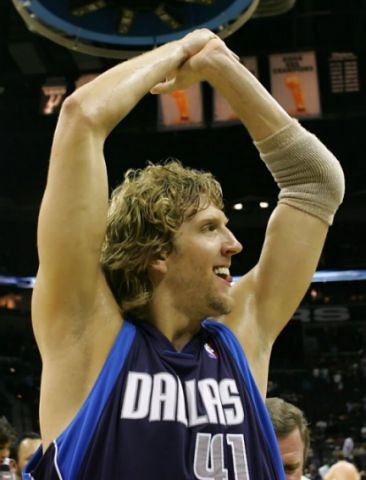
1. Boston vs. Philadelphia 1968 Eastern Division finals
2. LA Lakers vs. Phoenix 1970 Western Division semifinals
3. Washington vs. San Antonio 1979 Eastern Conference finals
4. Boston vs. Philadelphia 1981 Eastern Conference finals
5. Phoenix vs. Houston 1995 Western Conference semifinals
6. Miami vs. New York 1997 Eastern Conference semifinals
7. Detroit vs. Orlando 2003 Eastern Conference first round
8. Phoenix vs. LA Lakers 2006 Western Conference first round
Notice a pattern? First off, half of the comebacks have happened in the last 11 seasons...which means that a comeback from 3-1 is relatively more common than it was during the NBA's first 48 seasons. But that's secondary. The most important aspect of this pattern is that, of the eight comebacks, seven of them were accomplished by the team that originally had the home court advantage. In this case, that would be the Spurs.
I've personally watched five of the eight series. The key component seems to be winning Game 5. In his 1989 autobiography, Drive, Larry Bird repeatedly stressed the importance of winning the fifth game of a seven game series. "Game 5 is a crucial game," Larry said. "The team that wins game usually ends up winning the series." And while there are certainly many examples in which the team that won game five didn't win the series, it's obviously happened in every 3-1 comeback (if it hadn't, there would have been no comebacks).
The common component in these games seems to be that both teams are very evenly matched. I think that, once a team returns home for Game 6 after having been up 3-1, all the pressure is on them to win that game. After all, winning a Game 7 on the road may be even more unusual than coming back from being down 3-1 (although I don't have the exact numbers on that). The mental strain of feeling as though Game 6 is your last chance to win is more than all but a few very mentally tough teams can withstand.
So the Mavericks are facing some tough questions. Can they win Game 6 without Jason Terry, their quarterback, their second-best player, and probably the MVP (so far) of this series? And if they don't, are they good enough, and tough enough, to win Game 7 on the road, against a San Antonio team that rarely loses at home...and has the undisputed edge in elimination game experience? The answers to these questions will be very, very interesting.
Barkley carried that same "pull no punches" attitude into the announcing booth. It was like a breath of fresh air. Finally someone who didn't kiss ass and try to avoid saying anything even remotely controversial. I even dubbed him the "Round Mound of Retort" in tribute to his knack for telling it like it is, regardless of the subject matter or people involved. Yeah, he's gotten a fat, and even a little lazy in his commentary, but he doesn't mince words, doesn't hold back, and he says what other people don't have the guts to say. He even threatens to beat up his co-anchors, Kenny Smith and Ernie Johnson. Now that's entertainment.
But Barkley let me down last night. Big time. It was supposed to be a showdown between Sir Charles and Kobe Bryant, over comments Barkley made after Kobe threw in the towel halfway through the Lakers' Game 7 loss to the Suns. Chuck called Kobe selfish, Kobe responded with several expletive-filled text messages (which Barkley gleefully referenced on the air), and so TNT decided to bring Kobe in to be questioned and then tell his side of the story.
Everybody was expecting a showdown. What they got wasn't worth the five minutes it took to watch. Barkley explained (again) why he called Kobe selfish, and then apologized (?!) for making Kobe's text messages public knowledge. Kobe then responded with his lame "I was just sticking to the game plan" excuse, and that was it. No rebuttle, no point/counterpoint, no closing statements by both sides. Charles threw in a quick question about Kobe's upcoming number change right before they went to commercial, and then -- just like that -- it was over.
I still can't believe it. The "game plan" excuse doesn't hold any weight with me, and it shouldn't hold weight with anybody else, either. Kobe quit that night, plain and simple. Phil Jackson wanted to pound the ball inside, get other guys going, fine. That's one thing. But Kobe stood at the top of the key, passing off to teammates and emphatically pointing at them as if to say, "No, you do it. I'm done." He didn't drive to the hoop to create shots for his teammates. He didn't crash the boards. He didn't lock anyone down on defense. I have the game saved on TiVo, and I will sit down with anyone who disagrees and ask them to explain why Kobe spends the second half standing outside the three-point line just watching. Watching. Not participating in the triangle. Not setting up his teammates. Just...watching.
Charles should have asked the same thing. Great players don't have to score to be effective. There were times Larry Bird had to pull back and let McHale, Parish, and Cedric Maxwell carry the scoring load. But he didn't just stand there twiddling his thumbs. He got involved. He hit the boards with a vengence. He created. Kobe has as much natural talent as anyone who has ever played, and he's honed his skills to a level that amazes even me, his harshest critic. But there is no way to defend his inactivity in the second half of that game. He didn't need to take 20 shots that half. He could have contributed in countless other ways. That, more than anything else, is why what he did was selfish and self-serving.
I don't know what kind of voodoo mind control they used to shut Charles up. When the segment began, you could practically see Barkley quivering with anticipation. So what happened? Was he given orders not to aggressively question Kobe? Was he intimidated by Bryant? It doesn't make any sense. Being so passive, even apologizing, that isn't Barkley's style. Never has been. But it was last night. And as a result, he left a lot of people shocked and let down. I wish I knew why. I doubt we'll get any better of an answer to that question than we got about Kobe's disappearing act against the Suns.
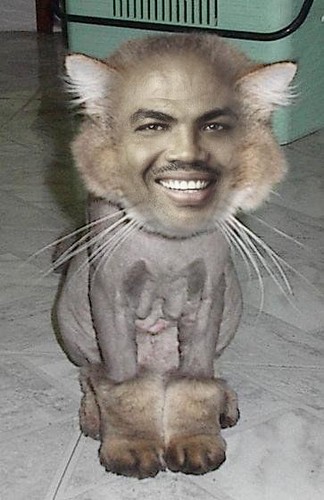
It wasn't just your average, every-day blocked shot, either. It was a full-blown smother chicken, with a heaping helping of ego-ectomy on the side. It seems like only yesterday we discovered the secret of how Dirk stays calm during these stress-inducing situations. So the question is: what was he thinking when Bowen put the clamps on him last night? Where was David Hasselhoff when the Mavericks really needed him?
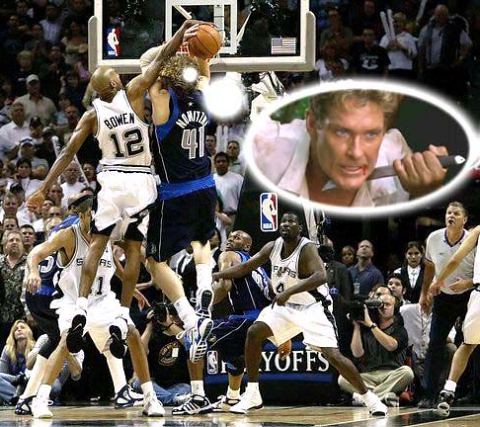
All is not lost for the Mavs, of course. After all, they have two more chances to put the series away, and Game 6 is in Dallas. But they let a golden opportunity slip away last night. They played with all the confidence of a team that's up 3-1, and they almost stole another game in San Antonio, where the Spurs have been nearly invincible over the last seven years. But, if history tells me anything, the Mavericks will probably come out stiff and tentative in Game 6. See, by that time, they'll have come to the jarring realization that, if they don't win at home, they'll have to clinch the series on the road...a near impossible feat.
The fact is, the Mavs panicked. Dirk rushed that shot against Bowen. Then, two jump balls later, Jason Terry rushed his last-second shot, and Nowitzki rushed the follow-up. Game over. Of course, the Mavericks have a lot to be encouraged about. Tim Duncan was spectacular (he hit his first 12 shots, which tied an NBA playoff record for most shots without a miss), the Spurs were smoking all night (a combined 53 percent from the field), and they got 12 more freethrow attempts. In other words, the Spurs took their best shot, and the Mavs still had a chance to win it at the end.
What a series, though! Except for the Game 2 blowout, every game has been a nail-biter. Game 4 was decided by five points in overtime, Game 1 was decided by two points, and Games 3 adn 5 were decided by a single point. This might be the most competitive and evenly matched series since the 1981 Eastern Conference Finals between the Celtics and Sixers. And the circumstances of that series were remarkably similar to this Spurs/Mavs matchup. The Celtics and Sixers were also in the same division, and both teams won 62 games. Boston won the division, but it took three tie-breakers to decide it. The Celts had the homecourt advantage, but quickly coughed it up and went down 3-1. Games 4 through 6 were each decided by two points, and Games 1 and 7 were decided by only one point. And, as everyone knows, the Celtics came back to win the series...and the championship. I'm very interested to see whether history repeats itself.
Another thing you might not know about Dirk is that he gets nervous like the rest of us, especially when he's at the freethrow line. But instead of doing what anyone else would do when their nerves are strained -- imagine hot women in their underwear -- Dirk, er, sings to himself.
He isn't singing cool rock songs like I Stand Alone by Godsmack, or even timeless German classics like Adolph Hitler's Der Nachtmusik zum Kuchen Herren bei. Nope, big Dirk is humming inspirational ballads by none other than that maestro of magnificence, David Hasselhoff.
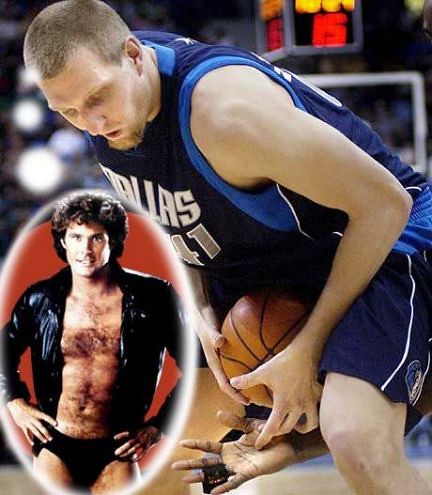
How cool would life be if every time something bad happened, the reassuring image of David Hasselhoff was there to help you through. Those manly pecs, that thick, lusterous chest hair. David, take me away!
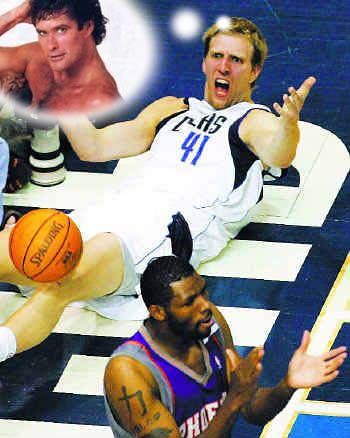
Seriously, name one problem David Hasselhoff couldn't fix. Stuck in traffic? He could call K.I.T.T. to just turbo boost you out of there. Drowing in the ocean after a shark bit your legs off? He'll send Pamela Anderson's boobs out to rescue you. Need to book music for your wedding? The dude sings. So next time you're in a sticky situation, like maybe playing the saxophone without any pants on, just think about David Hasselhoff. He'll be there for you.
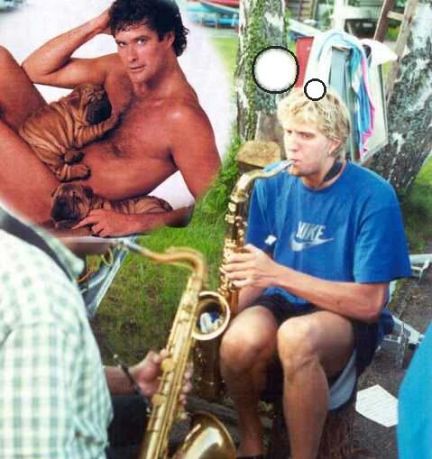
"As far as Horry, I would say he's not the same as the rest of the guys you've mentioned. With the exception of Rasheed Wallace in last year's finals, everyone on the floor usually knows how dangerous Horry can be. I don't think anyone doubts Horry's worth beyond his numbers, do you? After all, the dude has 6 rings, and those aren't Jack Haley rings, in many cases it could be argued that the teams he played for wouldn't have won the titles without his big shots. Especially in 2001, 2002, and 2005."I both agree and disagree with what you're saying (and, naturally, I appreciate the unexpected but completely accurate boot-to-the-head of Jack Haley). Yes, it's absolutely true that players and experts regularly give due credit to Horry's contributions. There's a reason he's referred to as "Big Shot Rob" (or "Big Shot Bob", depending on who's talking). But, despite his history of hitting critical shots in key games, someone always ends up leaving him open. And Rasheed Wallace isn't the first person to do it. Remember the shot that almost beat the Spurs in Game 5 of the 2003 Western Conference Semifinals? Sure, that's an example of a big shot he didn't hit (and I can't help but think the Lakers would have won that series if that one shot hadn't rimmed out), but the point is this: somebody left him open (maybe because he was 2-for-38 in threes during those playoffs). Would Shaq or Kobe ever have been left open in that situation? Of course not. In fact, the defense was sagging toward those two players, which is why Horry was open.
We could sit down and make a loooong list of the critical shots Robert Horry has hit. The question you have to ask yourself is this: how has he done it? Because let's face it, Horry isn't a gifted athlete. He's not a big-time leaper. He's slow. He's old (now). And he's never really had the ability to create his own shot anyway (which is why all those Scottie Pippen comparisons in the mid-90s died a cruel and bitter death). His game, and all those crucial baskets, have relied on the fact that, at some point, his defender forgets about him. Then BOOM! Game over.
The real difference between Horry and the other people I talked about is his longevity. He's been playing the Intangible Man for 14 years, and (as you pointed out) he's been a major contributor in six championships with three different teams (despite playoff averages of only 9 PPG on 43 percent shooting). As a result, he's earned a reputation that most Intangible Men never achieve. I mean, some people last year argued that Horry should be named Finals MVP...despite modest averages of 9 points and 5 rebounds a game. That movement never picked up any steam, but has any player in history even been considered for Finals MVP after averaging 9 points? It's due mostly to the fact that he exploded for 21 points in Game 5 (including the 3-point clincher). Yet make no mistake; he scored those points on open shots (except for that sick one-handed dunk he threw down in overtime) and hit the game winner only because he'd been left open. Superstars, All-Stars, and big-time scorers aren't left open on the last possession. But, historically, Robert Horry has been. And, unless he retires after this season, he probably will be again.
Most teams defend game-winning shots with the following assumption: "We cannot let the superstar beat us." Unfortunately, no one has ever kept track of game-winning assists. But I'm here to tell you, Larry Bird had scores of them. I have games on VHS where everyone from Jerry Sichting to Scott Wedman hit a game-winning or game-clinching shot, courtesy of a pass from Larry Legend. Similarly, Horry always seems to be on the receiving end of a pass from a double or triple-teamed star. And I tend to think that he wouldn't be so wide open if he was a major offensive force. Would he have been left open if he scored 25 points a game and was a major component of his team's offense? I doubt it. That's why I called him the ultimate Intangible Man. He'll never truly carry a team (except for maybe the rare game here or there). You'll never be able to look at a box score and say, "Hey, this guy won the game." But he has done it time and time again, despite his reputation for hitting big shots.
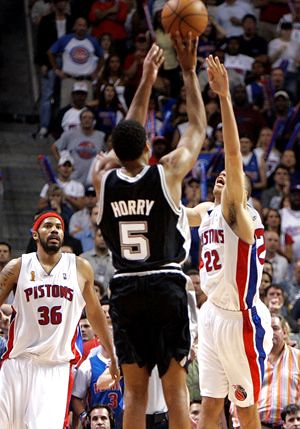
Gak. Seriously, was that game painful to see or what? It was like watching two old ladies fight over the nickle cans of cat food at your local supermarket. Sure, it's sad and disgusting, but on the other hand it's also completely pathetic.
Just how bad was it? The bricks were flying so fast and furious that players on opposing teams were quailing in fear and hugging each other for support. You think I'm kidding? Well, see for yourself:
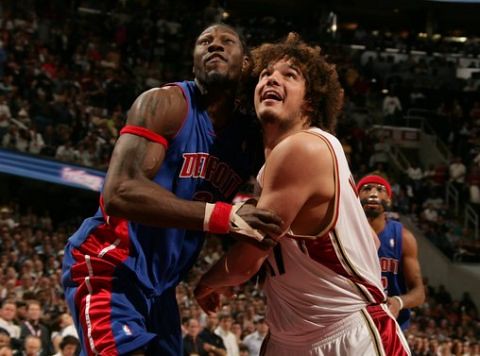
The best part of the whole ordeal, besides the fact that it ended, was that 'Sheed couldn't even back up his own words, thanks to a sprained an ankle and a pitiful 3-of-13 shooting performance. His public humiliation was my happiest moment since, well, since Kobe pulled a Shoeless Joe Jackson in Phoenix a couple weeks ago. Rasheed Wallace is a douchebag, and I love hating him. It gives my life meaning.
But I'll give Wallace this much: he tries (wittingly or no) to make things interesting. He says things nobody else has the guts to say anymore. Remember back in the 80s and early 90s, when it was okay to hate the guys you were playing against? Back then, players were constantly woofing it up to the media. Take 1984, for example. Prior to the Celtics' semifinal matchup against the Knicks, Cedric Maxwell proclaimed that he was going to shut down the league's scoring champion, Bernard King (who, by the way, was fresh off a first round series in which he'd averaged 42 points a game...with dislocated fingers on both hands). Max said, "I'm gonna stop the bitch. The Knicks are going to lose. There's no question about it." He then added a little spice by mimicking King's distinctive gait and saying, "No way a guy who walks like this is gonna get 40 on me." After the Celtics went up 2-0, Kevin McHale said, "They're in the grave right now, and we've got the shovel in our hands." Did all this talk inspire the Knicks? Well, King scored 40 twice, and the Knicks pushed the series to seven games, so maybe it did. But it made for a much more intriguing series.
And the trash talk wasn't limited to the opposition, either. Bird blasted his teammates after the Lakers blew out the Celtics in Game 3 of the 1984 Finals. "We have a lot of great players on this team, but we don't have the players with the heart sometimes that we need. We played like sissies tonight." Then, after the Celtics came back to win Game 4 in L.A., Bird was asked whether the team had responded to his criticism and played their best. "Nah," Bird said, "We just played like a bunch of women tonight. We can play better." So in a three-day span, Bird insulted everyone on his team (himself included) and an entire gender. Can you imagine the outrage if somebody did that today? Especially someone controversial like, say, a Kobe Bryant? The sports writers and analysts would be all over it. In 2006, Bird would have been skewered. Back then, his words were inspirational. How times have changed.
Another thing to remember about Rasheed's guarantee. He was only stating what most fans, experts, and bookies were already thinking: that, all things being equal, the Pistons were the superior team and should have won the game. Of course, all things aren't equal, and the best team doesn't always win. Which, of course, is why they play the games. But basketball, like anything elese, is much more intriguing when there are heroes to love and villains to hate. ANd 'Sheed is that rare player who is secure enough in himself and his ability that he isn't afraid to be booed, isn't afraid to be hated. In fact, he seems to enjoy it. So thank you, Rasheed Wallace, for being so wonderfully hateable.
Usage example: Luol Deng is the Intangible Man for the Chicago Bulls.
Word Trivia: Have you ever listened to Hubie Brown call a basketball game? If so, I can almost guarantee you've heard him use this term, because it's one of his all-time favorites. Brown loves the underdog role-player, which is probably why he assembled an entire team of underdog role-players when he was coaching the Memphis Grizzlies. Every time someone like Brian Cardinal scores a clutch basket or grabs a critical rebound, you can practically hear Brown violently humping the telestrator. Despite the fact that he's an undead mummy with the power to steal my very soul, Brown has a point, because rare is the successful NBA team that does not have at least one Intangible Man on the roster. The Intangible Man is responsible for doing the little things that you won't see in the box scores: playing defense, setting picks, diving for loose balls, taking charges, and dispensing Gatorade during timeouts. Most importantly, the Intangible Man must hit the big shot when left open and not make mistakes in critical situations. The Spurs have Robert Horry (the ultimate Intangible Man), the Lakers had Horry and Rick Fox, the Bulls had numerous Intangible Men (Bobby Hanson, Jud Buechler, Scott Burrell, Stacy King, et al.), the Rockets had Horry, so on and so forth.
The beauty of the Intangible Man is that his lack of statistical accomplishment actually makes him more dangerous. Most fans, and even many so-called experts, have trouble seeing a player's worth beyond the numbers that appear in his player bio. That's why so many people wet their pants when Steve Nash won the MVP over Kobe this season. "Nash could never score 81 in a game!" they'd say. But Nash brings something to his team that can't be measured by his PPG, or even his APG. The same holds true when you compare Wilt Chamberlain and Bill Russel. Russell never even averaged 20 a game, whereas Wilt once averaged 50 and even scored 100 in a game. But all of Wilt's points couldn't stop Russell from winning 11 championships in 13 years, and 7 of 8 head-to-head playoff matchups against Chamberlain's teams (which had plenty of talent, no matter what some people claim).
But I digress. The true Intangible Men aren't Superstars or All-stars. They're the "average Joe" of the NBA scene. Guys whom you never notice until, say, Jordan passes off to him for a game-winning three-pointer. And, if you're rooting against that team, you're likely to ask, "Why did they leave that guy open?!" The answer is obvious: since he doesn't score 20 ppg, he isn't worthy of the opposition's best defensive effort. Most players tend to sag off the Intangible Man, even if they aren't part of a double-team or otherwise involved in the current defensive scheme. Awed by the superstar, they more often than not leave that Intangible Man alone to wreak havok with an open jumper or a maybe an offensive rebound. And sure, maybe they rarely get the headlines and almost never get the big contracts, but Steve Kerr still has five more championships than Charles Barkley, Elgin Baylor, Patrick Ewing, Karl Malone, John Stockton, and Dominque Wilkins combined.
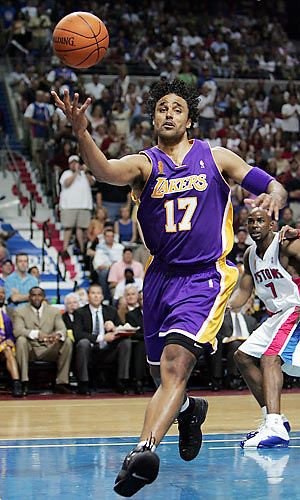
It actually started with Pat's listless "I don't give a damn" shuffle downcourt. I mean, the 12th man usually hustles his ass off if he actually gets to play in a game, but not Pat. He started out doing one of those fake runs, you know, the kind that isn't any faster than a walk (and might actually be slower). Then about halfway down court he just says "fuck it" and openly walks the rest of the way. He stands there for a minute, sets a half-hearted pick, and then immediately begins the slow, backward walk to get back on defense. Then, unexpectedly, he receives the return pass about, say, 35 feet from the basket. Rather than take a few steps in, or passing the ball to someone else, Pat shoots the damn thing...with barely a moment's hesitation. The worst part is, he hit the shot! And so, in less than a minute of playing time, Pat Burke outscored Kobe by 300 percent. I think we need to design a Pat Burke 3-point shirt. Could be a collector's item.
If you want to see it and don't mind watching grainy footage taken with a camera phone, then by all means click the pic.
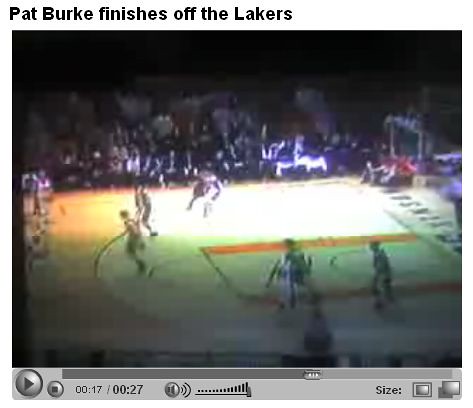
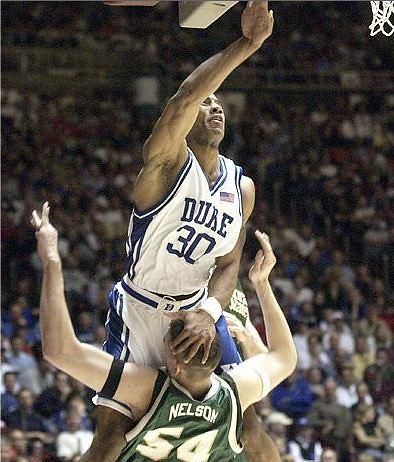
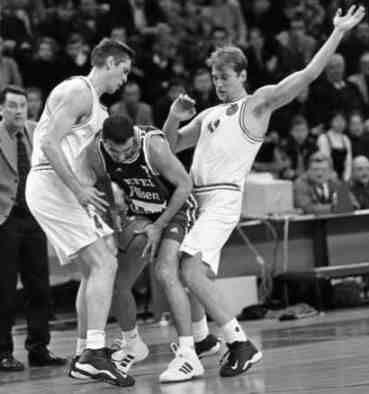
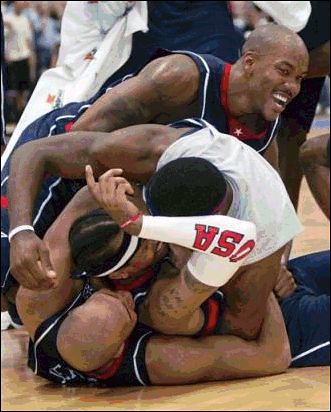
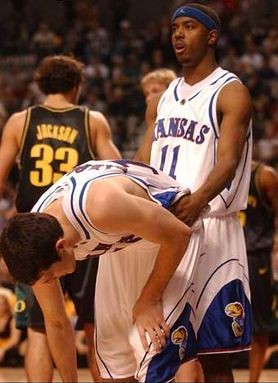
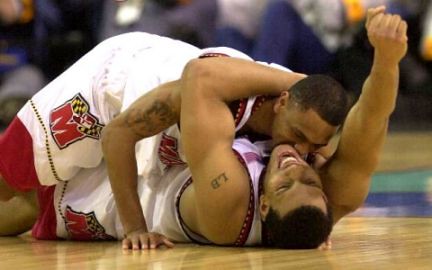
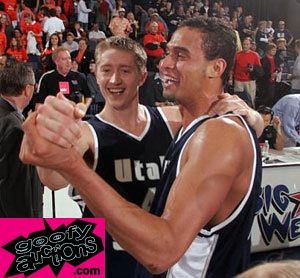
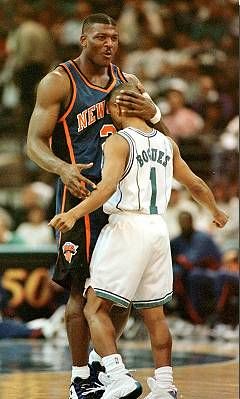
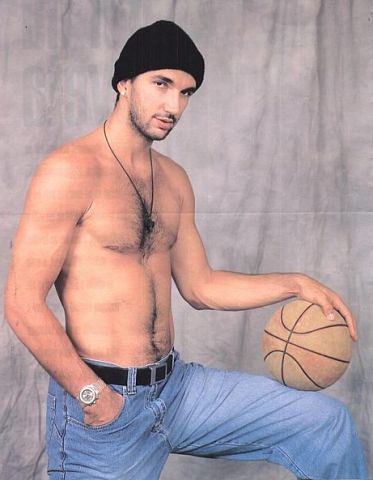
This one is wrestling instead of basketball, but Jesus square-dancing Christ...
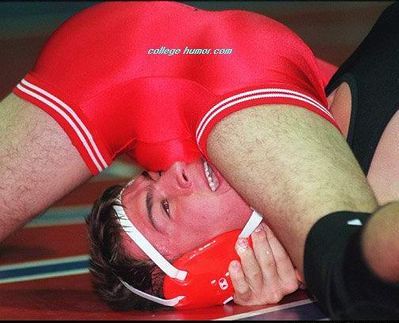
Howard, playing out the tail-end of a $37 million contract denies any wrongdoing, of course. In a carefully scripted statement, Howard said, "I'm aware of the situation and have spoken to my attorney. I will vigorously defend myself and am confident I'll be cleared of these baseless charges."
Uh huh.
The store owner claims to have a surveillance tape showing Howard take a pair of sunglasses. Apparently, Howard assumed he'd already used the power of his mind to stop time or destroy any cameras. Who knows if it's true, but if it is, it'll go down as the second saddest example of celebrity shoplifting ever.
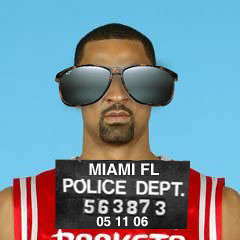
Usage example: There was a lot of gamesmanshit going on between Raja Bell and Kobe Bryant in that Suns/Lakers series.
Word History: The late Wilt Chamberlain coined this term in his 1991 autobiography A View From Above. He said that cheating is perfectly acceptable...as long as you don't get caught. He then (quite gleefully) described several of the little tricks he used to cheat at everything from basketball to poker (due to his prodigious height, he could peak over someone's hands and see what cards they were holding). At least he acknowledged that these shady tactics are generally looked down upon, at least by the victims, which is why he called it "gamesmanshit" instead of "gamesmanship." We've seen plenty of gamesmanshit in the 2006 NBA playoffs, from Kobe's "Macho Man-esque" elbow smashes, to Raja Bell's clotheline, to the now infamous Reggie Evans nut-mugging of Chris Kaman. It should be noted, however, that Reggie Evans isn't the first NBA player to wreak havok on the opposition's genitals. Let's not forget that Karl Malone would, from time to time, make a special delivery to someone's package courtesy of his kick-out jumpers. My all-time favorite example of this is when he gave it to good old Big Shot Bob. That's Crunch City, baby.
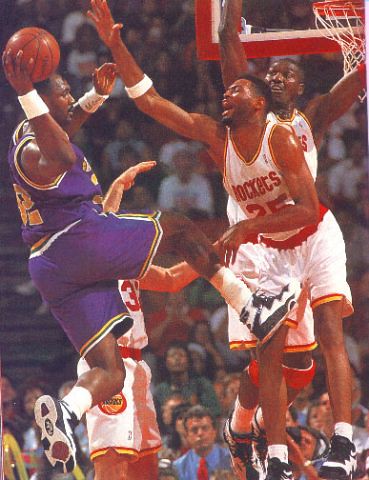
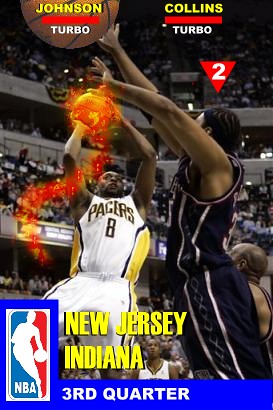 The Indiana Pacers season ended in fitting fashion last week with a 90-96 loss to the Nets, a game that wouldn't have been remotely close if Anthony Johnson didn't go into NBA Jam mode and drop 40 on Jason Kidd's head. When a team relies on a career night from a career backup to stay competitive in the biggest game of the season, its safe to say some drasic changes will be made in the off-season.
The Indiana Pacers season ended in fitting fashion last week with a 90-96 loss to the Nets, a game that wouldn't have been remotely close if Anthony Johnson didn't go into NBA Jam mode and drop 40 on Jason Kidd's head. When a team relies on a career night from a career backup to stay competitive in the biggest game of the season, its safe to say some drasic changes will be made in the off-season.Of course the blame falls first on Jermaine O'Neal, but it seems the bigger problem is when Jerm is put in a position where he's responsible for most of the Pacer's offense. Game 2 against the Nets is a good example (12 pts on 3-12, AJ had to play 40 mins and scored 17). Jerm is "20 ppg" good, not Karl Malone good. But Pacers fans expect him to be Karl Malone good, although he is quite stoppable, especially against physical play (e.g. 10 ppg against the Wallaces this year, 15 against Elton Brand). But Bird is adamant that Jerm is steering this ship, and as-is he's a top 5 PF. Unless we can score a swap for KG, he's going nowwhere. At least he shouldn't. The real issue is surrounding him with some capable scorers.
Stephen Jackson is probably sitting on the hottest of hot seats at this point. The Man They Call Skeletor fell out of favor for multiple reasons. After a respectable 2005 campaign, Jax's offense could best be described as "lazy". Often ball movement would come to a complete stop in his hands, then Jax would puke up a 20-footer with a hand in his face. This was a far cry from the heroics Reggie treated us to through the years, a comparison Jax resented plenty. His numbers slid as a result and, combined with the increasing pouting and the love of arguing with everyone in sight, this throws up red flags about his upside.
The point guard position is a question mark as well. It's time for the Pacers to pull the plug on the Jamaal Tinsley project. Tinsley shows lots of promise when healthy, but you can't expect your team to develop any type of rhythm when the man running your offense misses 40 games a year. And you can't expect to build around Anthony Johnson, who had his John Bagley year this season; the aging stocky point who, at age 31, mysteriously plays over his head at the most opportune time. If Bagley is a measuring stick, Johnson will be retired in two years. And what's-his-name Sarunas Jasikevicius looked more like a combo guard than a pure point, and I expect him to slide into Fred Jones' soon-to-be-empty role.
Larry Bird is set on resigning Peja Stojakovic, but I've never been completely sold on Peja fitting in here. Peja is a player that gets his points off of ball movement, but the Pacers barely average 20 assists a game as a team, nearly in the bottom 10 in the league. Plus that Danny Granger guy also plays the 3. And, with Ron Artest gone and assuming Tinsley and Jax aren't far behind, suddenly the Pacers look like an increasingly soft defensive team.
I'd be surprised if Jax is back next year. His trade value is pretty low, but unfortunately he was our best defender at times this year. I'd send Jax to Golden State for Mickael Pietrus, a backup 2 who's been masquerading at the 3 for years now. Pietrus and Sarunus can split time at the 2, and I'm sure Atma Brother would be glad to throw in Dun Dun Jr. for salary cap purposes. Or for no reason at all.
Reportedly both Isiah Thomas and Larry Brown are fans of Jamaal Tinsley, and if any GM would trade for a player that's as reliable as a 10 year old condom, it's Isiah. I had a vision that Donnie Walsh shipped Tinsley, Austin Croshere and the 17th pick for Stephon Marbury. On paper it sounds intriguing, the Pacers finally get a player that can create his own shot, the Knicks get Croshere's expiring contract, and Larry Brown finally gets a point guard that plays "the right way" that isn't Eric Snow or Mark Jackson. But I'd hesitate to add Marbury to a Pacers locker room that already ripe with attitude problems. On a less extreme note, free agent Speedy Claxton would also be a good fit, a distributor that can play some D, but has also had injury problems in the past. Another Pacer in street clothes? He would fit in! Sigh...
Peja to the Lakers for Lamar Odom? Peja is perfect to stretch Phil Jackson's triangle offense John Paxson-style, and the Pacers get a swiss army knife that can play both forward spots, create offense and rebound. My gut says sign-and-trade with Peja, but I'm willing to give it some time to play out.
Of course, I'm just some guy with a blog. What do I know?
February 2005
October 2005
November 2005
December 2005
January 2006
February 2006
March 2006
April 2006
May 2006
June 2006
July 2006
August 2006
September 2006
October 2006
November 2006
December 2006
January 2007
February 2007
March 2007
April 2007
May 2007
June 2007
July 2007
August 2007
September 2007
October 2007
November 2007
December 2007
January 2008
February 2008
March 2008
April 2008
May 2008
June 2008
July 2008
August 2008
September 2008
October 2008
November 2008
December 2008
January 2009
February 2009
March 2009
April 2009
May 2009
June 2009
July 2009
August 2009
September 2009
October 2009
November 2009
December 2009
January 2010
February 2010
March 2010
April 2010
May 2010
June 2010
July 2010
August 2010
September 2010
October 2010
November 2010
December 2010
January 2011
February 2011
March 2011
April 2011
May 2011
June 2011
July 2011
August 2011
September 2011
October 2011
November 2011
December 2011
January 2012
February 2012
March 2012
April 2012
May 2012
June 2012
July 2012
August 2012
September 2012
October 2012
November 2012
December 2012
January 2013
February 2013
March 2013
April 2013
May 2013
June 2013
July 2013
August 2013
September 2013
October 2013
November 2013
December 2013
April 2014
May 2014
June 2014
July 2014
August 2014
June 2018
July 2022

